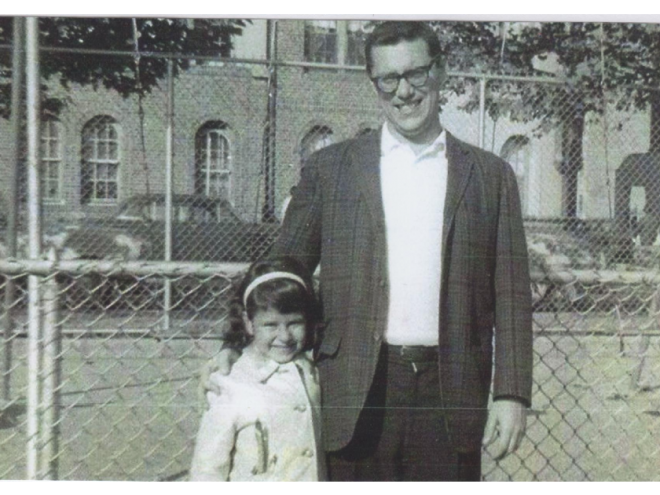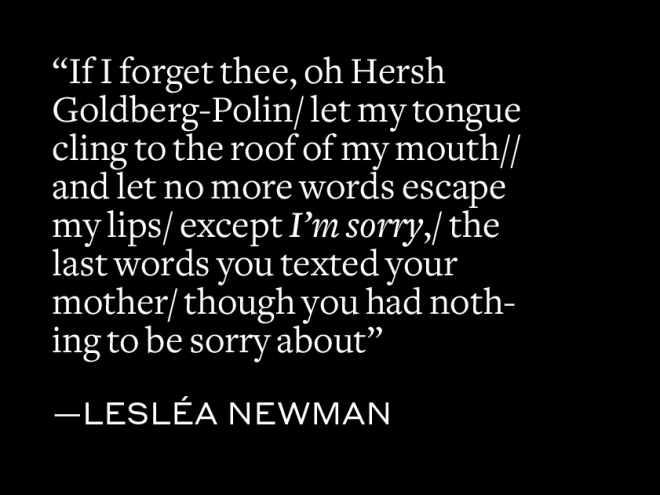Award-winning writer Lesléa Newman has written a newly published collection of poems, I Wish My Father, a companion to her book I Carry My Mother (published in 2015, also by Headmistress Press). I Wish My Father paints a lyrical portrait of Newman’s father, centering on the last years of his life through narrative, dialogue-driven poems.
During the last years of her parent’s lives, Newman finds herself in the role of caregiver. These poems speak to the common struggles that adult children face when coping with aging parents. The conversations between the speaker and her father are heartfelt and intimate, shedding light on the experience of watching the mental and physical decline of a cherished parent.
Newman struggles with witnessing the pain and loss that her father endures, and she notes how aging impacts the way he interacts with others, in sometimes embarrassing, sometimes humorous ways. In the poems “Did You Go to City College?” and “Who’s That?”, Newman shows how her father’s witty, confident attitude reflects the way he once moved through the world. She also describes how he holds on to his stubborn ways and won’t listen to his daughter’s good-natured advice. He insists on acting like his former youthful self. In the poem “Pain in the Ass” she states that he “would rather break 100 copiers / than admit he needed help.” In the end, it pains her to hear him finally admit, “Your old man is falling apart.” His descent into memory and hearing loss is excruciating for both of them.
All of the poems’ titles bleed into the first line of the poem, one moment easily leading into the next. Newman also formats the poems the same way with three-line stanzas that build the story of her father’s last years while also lingering on the past. When her father finally acquiesces to his neurologist’s suggestion of quitting his job and giving up driving, Newman recalls in “The Second Time We Visit” her late mother’s realization that the saddest thing in the world is “getting what you want.” Newman wanted her father to stop driving and focus more on his health instead of working, but once this becomes a reality, she sees the sadness in her father’s face, how he “stares straight / ahead without speaking,” and she feels the weight of watching him lose the things in life that gave him joy.
Newman writes about how difficult it was for her father to lose his wife of sixty-three years. When it is time for him to live alone, he loses many of the routines cultivated over a lifetime; leaving his proudly-owned home was like abandoning a part of himself. In “Did You Happen to Speak,” she writes of her parents’ relationship, “He made the money, she spent it.” Ultimately, Newman concludes that “everything he’s ever worked for / amount[ed] to nothing / but this one lousy / done deal,” referring to the fact that he was no longer a provider for a wife and family. Newman’s poems allow the reader to take part in these father-daughter conversations, a moving reflection on grief and love.
Jamie Wendt is the author of the poetry collection Laughing in Yiddish (Broadstone Books, 2025), which was a finalist for the 2022 Philip Levine Prize in Poetry. Her first book, Fruit of the Earth (Main Street Rag, 2018), won the 2019 National Federation of Press Women Book Award in Poetry. Her poems and essays have been published in various literary journals and anthologies, including Feminine Rising, Catamaran, Lilith, Jet Fuel Review, the Forward, Minyan Magazine, and others. She contributes book reviews to the Jewish Book Council. She won third prize in the 2024 Reuben Rose Poetry Competition and won second prize for the 2024 Holloway Free Verse Award through the Illinois State Poetry Society. Wendt holds an MFA in Creative Writing from the University of Nebraska Omaha. She lives in Chicago with her husband and two kids. Follow her online at https://jamie-wendt.com/ or on Instagram @jamiewendtpoet.





